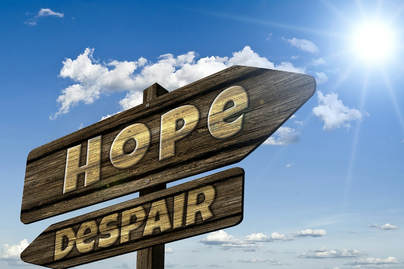 I write this from the second floor waiting area of University Hospital in Cleveland, OH. It's an odd place, feeling like home and yet having never been here, in this precise space, before. I'm praying in vigil for my sister in Christ and sister of choice Karen, whose second cancer surgery this year was successful, only to be plagued by complications since this latest surgical intervention a week ago. This room, with it's necessarily wipe-able plastic furniture and unexpectedly empty seats on a Sunday, feels familiar for at least two reasons. To quote Hawthorne Heights (my emo game was strong in high school and college), my heart is in Ohio. Though I love Virginia, where I live and serve, as well as North Carolina and South Carolina, where I've lived and was educated for service to the church, Ohio is where I met God, where God found me, where I was born into a loving family and reborn into a wonderful church family at my baptism. Ohio is a home to me, so the very same hospital here would feel more familiar than if it were in Kazakhstan, Belize, or Wyoming. Yet, since I've left this original home, I've sat in a number of hospital waiting rooms alongside family who are hoping and praying for the healing of their loved ones. Simple, elective procedures and sudden, complicated interventions alike, I've found an odd stability in these otherwise unstable environs. No waiting room is a home, per se, but I've been prepared by the church and the academy to exist in this liminal space between sickness and health. The date is also important for two reasons. It's August 13th, the day after violence broke out in Charlottesville as a white supremacy demonstration led by the KKK, NeoNazis, and other Alt Right groups was met by counterprotesters advocating for racial equality. Our church, the Evangelical Lutheran Church in America, was among those nonviolent demonstrators, confronting messages of hate with the Gospel declaration that, "we stand against all forms of hatred and discrimination. We believe that cultural, ethnic and racial differences should be seen and celebrated as what God intends them to be – blessings rather than means of oppression and discrimination. We are a church that belongs to Christ, where there is a place for everyone. Christ’s church is not ours to control, nor is it our job to sort, divide, categorize or exclude." It's a day where we vigil not simply for peace in America, but for God's good justice that declares all people worthy of equal inclusion in the Kingdom of God because we all, of every race and gender, of sexual orientation and ethnicity, of language and ability, are made in the image of God and made one in Christ Jesus, This also ends the first week of my life where nuclear war seemed a legitimate, albeit not likely, possibility. The leadership of our own United States, along with that of North Korea, seem hell bent on a hellish end to a conflict that's lasted for over seven decades. We vigil not just for cooler heads among heads of state, but for a worldwide commitment that we would turn our swords into plowshares and spears into pruning hooks. I learned to vigil for the great feasts of our faith, Christmas and Easter. More precisely, from those feasts I learned to vigil for the Lord's presence, for God's answer to our prayers that comes most clearly and distinctly in Jesus Christ.T This word vigil is most common after tragedies, where people gather with candles, drawings, and stuffed animals to support one another in the pursuit of healing after pain. This is included in the Christian sense of vigil, but there's a key difference. Many churches hold Christmas Eve services, and if you've been to one, it may have felt simultaneously much like a vigil and entirely different. The candles are there, as are spiritual songs and readings common to the vigils we experience in wider society. But what makes Christmas Eve (and Holy Saturday, the day before Easter Sunday) different is that, at these vigils, we already know the end of the story. After Columbine and Sandy Hook, after Charleston and Orlando, we vigiled not knowing the outcome of our experience, not knowing the answer to our lament. In the church, we vigil already knowing the end to the story. In Jesus, God's already established the kingdom of God. We vigil because we hope in God's promises being realized. We vigil because we hope in the truth God has told us. To vigil is an expression of hope. I'm here in a waiting room, feeling at home not just because it's in Ohio or because I've spent days of my life camped in a hospital waiting room before. I'm at home because, in Christ, we're at home in hope. We're at home because we know how the story ends, with all things reconciled in Christ Jesus, even though we don't know what the journey looks like between here and there. We're at home in hope because, thus far along the way, we've seen Light when darkness seemed to reign, we've found the Way when the path seemed to disappear, we've heard the Truth when the cacophony of lies drowned all other voices, we've eaten the Bread of Life when starving seemed inevitable. I just got word that Karen's prognosis is looking up, that she should be able to eat and regain the energy that's been sapped from her bones. I've begun to hear from pastors who confronted racism in their churches, some to support and some to antagonism, but all with a renewed sense of purpose that God's on a reconciling mission and the whole church must take part. I even read that, despite the rhetoric coming from The White House and Pyongyang, back channel diplomacy is at work for peace. That's all good news, but we must remember that our hope didn't make these things happen. The God in whom we hope works in ways sometimes obvious, sometimes beyond our comprehension, yet always mysterious. Hope keeps us focused not on the despair, but on the God who rescues us from despair. That, then, is why we vigil. We await God's presence on Christmas and Easter, in hospital rooms and after tragedies like Charlottesville, in international politics and in our own homes. We vigil because we hope and we hope because God's given us reason to hope.
0 Comments
Leave a Reply. |
AuthorSimultaneously a sinner and a saint. Archives
September 2020
Categories |

 RSS Feed
RSS Feed